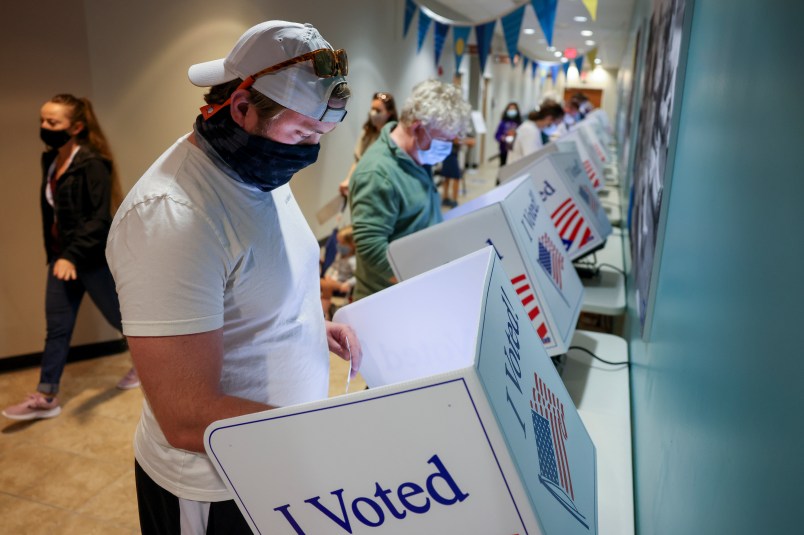This article is part of TPM Cafe, TPM’s home for opinion and news analysis.
As Americans stare down the final stretch of an unprecedented election season, it’s hard to miss the dire predictions of voter intimidation and militia presence at the polls on November 3. It makes sense that such concerns are on the rise, given the tense political environment and President Trump’s suggestion to his supporters to “go into the polls and watch very carefully.”
Thankfully though, what voters are most likely to see at their polling places this week are friendly election workers and fellow engaged citizens. Despite the long, dark history of “poll watching,” and other polling place harassment in this country, voter intimidation is relatively rare. This is in no small part due to the robust legal protections — as well as legal and community networks — ensuring voters can cast their ballots freely, safely, and privately without fear.
Both federal and state law protects voters from intimidation. Under federal law, it is a felony for anyone to intimidate, threaten, or coerce any other person in order to interfere with their right to vote, or even attempt to do so. This law protects voters from a wide range of intimidating conduct, including activities that would be considered lawful away from polling places.
For instance, verbally or physically confronting voters, asking voters for documentation, hindering voters from entering a polling place, and standing or hovering close to voters as they attempt to vote would all be considered illegal under the federal voter intimidation law. Violations are treated extremely seriously; any voting disruptor running afoul of the law could be sentenced to prison for up to five years, in addition to hefty criminal and civil fines.
State and local election officials are empowered to protect voters and maintain peace and safety at their polling locations. In fact, this is a core part of their responsibilities under most state laws. Notably, this critical duty involves making sure that any election observers at a polling place are following state laws regulating observer conduct. While these laws vary in substance from state to state, they prevent observers from electioneering inside the polling place, engaging with voters, or disrupting the voting process in any way. Likewise, while states have a variety of laws allowing challenges to voters believed to be ineligible, such challengers cannot engage in discriminatory or frivolous challenges and election officials have the authority to enforce such rules.
These myriad legal protections mean that Americans can largely expect to exercise their fundamental right to vote in a safe and welcoming environment. But, of course, this is not a guarantee that we will not see bad actors in some locations. Anyone made to feel unsafe or intimidated at the polls has recourse available to them. First, they should report any suspicious or intimidating polling place conduct to their local election official or poll worker immediately. They may also call a voter protection hotline, where trained election protection volunteers can provide assistance. Some states have their own voter protection hotlines, and any voter can call the national, nonpartisan Election Protection Hotline at 866-OUR-VOTE, or the U.S. Department of Justice at (800) 253-3931.
Anyone who thinks they may have witnessed voter intimidation should report it and make use of these resources, even those who were not personally targeted. We all have a duty to ensure that every eligible voter can cast a vote free from intimidation.
In a year different from any in our lifetimes, November 3rd will look remarkably different from any Election Day in memory. A record number of Americans have already cast their ballots. But if you have yet to exercise your fundamental right to vote this election, you should confidently do so, knowing that you are safe at your polling place and protected by the law.
Danielle Lang is co-director of the voting rights program at Campaign Legal Center, a nonpartisan election law advocacy organization in Washington DC. @DaniLang_DC.
Kate Hamilton is a Yale Law student and member of the Peter Gruber Rule of Law Clinic in New Haven, CT.







I’m glad for this sober, sensible article. At some point all the wild speculation about what “could” happen to suppress or nullify votes becomes voter suppression in its own right. Certainly, the President and his enablers deserve the majority of the blame, but the media does no one a favor by reacting and over-reacting to every tweet and even preliminary court rulings. While being prepared is well and good, being panicked isn’t.
Voting in person with a mask and proper distancing is safe, mail-in is fine, but if you’ve procrastinated and plan to mail your ballot on Monday or Tuesday, know that there is a risk. And I have to ask people who planned to vote by mail but haven’t gotten around to it yet, what the F have you been waiting for?
Voter Intimidation is Against the Law
But it’s not against the law to intimidate the intimidators.
I appreciate the sensible tone and information, but…
…have you met our new Department of Justice?